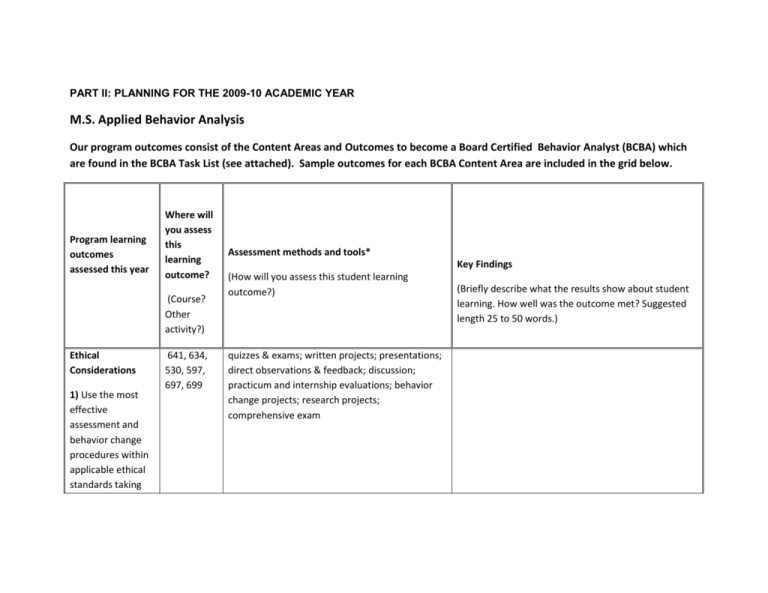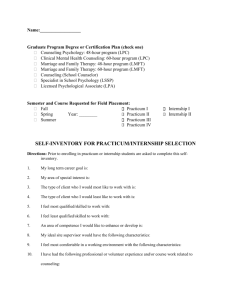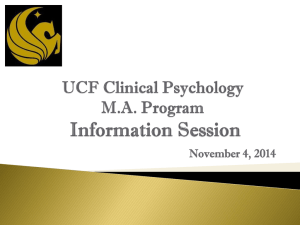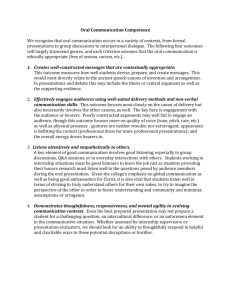Yes - St. Cloud State University
advertisement

PART II: PLANNING FOR THE 2009-10 ACADEMIC YEAR M.S. Applied Behavior Analysis Our program outcomes consist of the Content Areas and Outcomes to become a Board Certified Behavior Analyst (BCBA) which are found in the BCBA Task List (see attached). Sample outcomes for each BCBA Content Area are included in the grid below. Program learning outcomes assessed this year Where will you assess this learning outcome? (Course? Other activity?) Ethical Considerations 1) Use the most effective assessment and behavior change procedures within applicable ethical standards taking 641, 634, 530, 597, 697, 699 Assessment methods and tools* Key Findings (How will you assess this student learning outcome?) quizzes & exams; written projects; presentations; direct observations & feedback; discussion; practicum and internship evaluations; behavior change projects; research projects; comprehensive exam (Briefly describe what the results show about student learning. How well was the outcome met? Suggested length 25 to 50 words.) into consideration the guideline of minimal intrusiveness of the procedure to the client. Behavioral Definitions and characteristics 2) Explain and behave in accordance with the philosophical assumptions of behavior analysis, such as the lawfulness of behavior, empiricism, experimental analysis, and parsimony. Behavioral Principles, Processes and 630, 641, 634, 633, 635, 643, 530 quizzes & exams; written projects; presentations; direct observations & feedback; discussion; practicum and internship evaluations; behavior change projects; research projects; comprehensive exam 630, 641, 634, 633, 635, 643, quizzes & exams; written projects; presentations; direct observations & feedback; discussion; practicum and internship evaluations; behavior change projects; research projects; Concepts 530 comprehensive exam 634, 633, 530, 597, 697, 699 quizzes & exams; written projects; presentations; direct observations & feedback; discussion; practicum and internship evaluations; behavior change projects; research projects; comprehensive exam 641, 634, 530, 597, 697, 699 quizzes & exams; written projects; presentations; direct observations & feedback; discussion; practicum and internship evaluations; behavior change projects; research projects; comprehensive exam 3) Define and provide examples of positive and negative reinforcement Behavioral Assessment 4) State the primary characteristics of and rationale for conducting a descriptive assessment. Experimental Evaluation of Interventions 5) Identify and address practical and ethical considerations in using various experimental designs. Measurement of Behavior 6) Identify the measurable dimensions of behavior (e.g., rate, duration, latency, or interresponse times). Displaying and Interpreting Behavioral Data 7) Interpret and base decisionmaking on data displayed in various formats. 1) Selecting Intervention Outcomes and Strategies 2) 8) Make recommendations 630, 641, 634, 633, 635, 643, 530, 597, 697, 699 quizzes & exams; written projects; presentations; direct observations & feedback; discussion; practicum and internship evaluations; behavior change projects; research projects; comprehensive exam 630, 641, 634, 633, 635, 643, 530, 597, 697, 699 quizzes & exams; written projects; presentations; direct observations & feedback; discussion; practicum and internship evaluations; behavior change projects; research projects; comprehensive exam 630, 641, 634, 633, 635, 643, 530, 597, 697, 699 quizzes & exams; written projects; presentations; direct observations & feedback; discussion; practicum and internship evaluations; behavior change projects; research projects; comprehensive exam to the client regarding target outcomes based upon such factors as: client preferences, task analysis, current repertoires, supporting environments, constraints, social validity, assessment results and best available scientific evidence. Behavior Change Procedures 9) Use positive and negative reinforcement. 630, 641, 634, 633, 635, 643, 530, 597, 697, 699 quizzes & exams; written projects; presentations; direct observations & feedback; discussion; practicum and internship evaluations; behavior change projects; research projects; comprehensive exam 630, 641, 634, 633, 635, 643, 530, 597, direct observations & feedback; discussion; practicum and internship evaluations; behavior change projects; research projects 3) Systems Support 10) Provide behavior analysis services in collaboration with others who support and/or provide services to one’s clients. 697, 699 Measures of Professional Integrity 597, 697, 699 direct observations & feedback; discussion; practicum and internship evaluations; behavior change projects; research projects (see attached BCBA superversion form) 11) Maintains professional and courteous interactions with clients and coworkers. * You may attach or append copies of assessment tools (such as assignments, grading criteria, rubrics, scoring guidelines, or survey instruments). Please include these








